Homeschooling in Africa is still in its early stages when compared to somewhere like the USA that has over 50 years under her belt, while there are thriving Homeschooling communities in countries like Ghana, Kenya, Uganda, Nigeria, South Africa, etc. we still have a dearth of information about Homeschooling in Africa. In this article I would be exploring, our strengths and our unique challenges in Africa with regard to Homeschooling, and how we can still thrive regardless of those challenges.
Introduction:
Let's start with defining what Homeschooling is; I always define Home education as parenting pro max because your child is in your face 90% of the time but that's just my own definition, a more acceptable one is creating an individualized education for your child. It is an alternative form of education where parents take on the primary responsibility for their children's learning. I believe Africans need to embrace Home education as a viable alternative to education and not just for individuals but as a way to curb the current out-of-school children or children from low-income families, but that is a conversation for another day.
Understand The Benefits of Homeschooling in Africa:
Understanding The Challenges of Homeschooling in Africa:
Understanding the legal and regulatory concerns:
Understanding how to map out your child's education in Africa:
For you to make Homeschooling effective in Africa, you have to understand the trajectory your child's education will take so you can know what you would like to do. In the USA for example, there are different ways you can use to record your child's education transcript and everything they get up to so it makes transitioning to traditional school/college seamless, however, in most African countries there are no set guidelines or regulations to follow so you have to be proactive as a parent.
In whatever African country you are, you have to understand where your child will transition back into the traditional schooling or the exams needed to write to get into the university and prepare for that. I know in Nigeria, we write an exam after Primary 6, After Jss3 and SS3 (Jamb & Waec) to enter the university. You have to make a plan ahead to know where you will transition them and prepare them for those exams if you want to.
Understanding the need for assessment and record keeping:
Understanding the need for advocacy & recognition:
We offer free 30-minute consultations if you are new to homeschooling and you need clarity.

.png)
.png)
.png)
Well said , Thanks always.
ReplyDeleteWe need more awareness on and proper documentation in order to showcase the success stories.